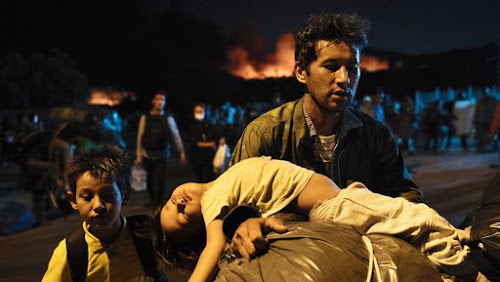Europe’s Shame: The Moria catastrophe and the EU’s hypocritical refugee policy
 |
| Spiegel Online 14/09/2020 |
The fire in the Moria refugee camp on the Greek island of Lesbos has revealed the full hypocrisy of the European Union’s refugee policy. Pressure is growing to finally take action.
By Giorgos Christides, Katharina Fiedler, Hubert Gude, Kevin Hagen, Barbara Hardinghaus, Valerie Höhne, Carolin Katschak, Katrin Kuntz, Timo Lehmann, Steffen Lüdke, Peter Müller, Maximilian Popp, Lydia Rosenfelder, Maria Stöhr, Britta Stuff and Steffen Winter
Shahrzad made it. She managed to escape the flames that transformed Moria, Europe’s largest refugee camp, into a wasteland of scorched earth. But now she doesn’t know where to go next. A shy 25-year-old from Afghanistan with delicate features, Shahrzad is sitting in front of the burned-out camp on the Greek island of Lesbos on Wednesday evening with her husband and two small children. What next? “We don’t know,” she says. They have their documents with them, she says, but little else. “We have hardly anything to eat, just a bit of water. Nobody tells us anything.”
The family had been living in Moria for eight months when the fire broke out on Tuesday night, and they were sleeping in their container in the camp. “It was cold. We were wrapped up in our blankets,” Shahrzad says.
Then, she smelled smoke. And she knew immediately that something was wrong. “We woke up. When we saw the flames and heard people yelling, we packed up the kids and ran out into the darkness up the hill.” They watched the flames in disbelief. Once again, their lives were being dissolved into nothingness.
“Moria was never a good place,” Shahrzad says quietly. The perennially overcrowded camp was always a desolate place full of misery and fear and the family was confronted by the anguish every day. But at least they had a roof over their heads.
Almost 13,000 people were suddenly made homeless by the Moria fire and Greek Prime Minister Kyriakos Mitsotakis declared a state of emergency for Lesbos. His government plans to temporarily shelter the migrants on warships or ferries in addition to tents.
The cause of the fire has not yet been precisely determined. On Wednesday, Lesbos was rife with all manner of theories, from plausible to absurd. Some were saying it was set by right-wing radicals, others blamed the refugees themselves, while still others were convinced Turkey was behind the blaze as a way of provoking the Greeks. On Thursday, though, the Greek Ministry of Migration Policy announced that the fire had most likely been started by the asylum-seekers themselves as a reaction to the coronavirus quarantine measures that had been imposed.
Lying in ruins
Undoubtable, however, is the fact that Moria isn’t the only thing lying in ruins. European asylum policy is as well.
The European Union wanted to establish Moria as a model. The concept called for asylum applications to be processed within just a few weeks at hotspots located on several Greek islands. Those recognized as refugees would then be distributed to other EU member states, while those whose applications were rejected would be sent back to Turkey. That, at least, was the process codified in the migration deal the EU agreed to with Turkey in 2016.
Little of it has been implemented, though. Instead of rapidly processing asylum applications, Greek officials have been holding asylum-seekers on Lesbos and other Aegean islands for extended periods – several years in some instances. Few refugees have been sent back to Turkey, but hardly any have been allowed to travel onward to northern Europe, either. The result is that more and more people have found themselves stuck on the islands.
The EU sees itself not only as an economic and political power, but also as a moral power. But on Lesbos, the bloc has forfeited whatever might have been left of its moral authority. It is no accident, no act of negligence, that asylum-seekers have been locked up and humiliated in Moria. It is an element of EU migration policy.



